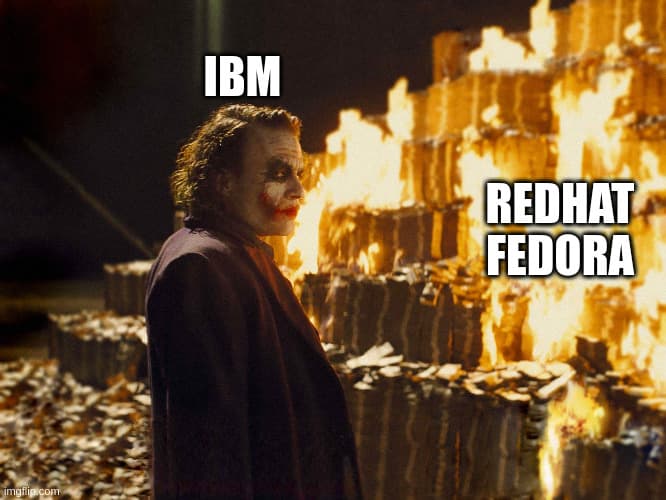That’s kind of my thought. We’ll see how Fedora plays out. For now, day to day, I’m pretty content with it.
https://elk.zone/mastodon.social/@Migueldeicaza/110626480082763652
Reading through this post now, but could be a bit more insightful.
Reminds me of tactics that Microsoft uses. I just hadn’t heard about this but yes. I do agree that the open source community has contributed to a lot of the successes of these corporate entities. It’s not right!
I think we’ll just have to wait and see how it turns out. My crystal ball just doesn’t have the resolution necessary to see how this mess will end.
I fully understand anyone in the open source community who does not feel like contributing to Fedora, as their contribution might end up being part of RHEL whose source code is locked away behind a paywall. And that makes me a bit more reserved and less enthusiastic towards Fedora.
That said, Fedora is still a very good distro, and I expect it to remain so in the near future. Since I’m not a customer of Redhat, I don’t really care what they do. I have an opinion about it, I think it’s rotten and scummy, but it does not really affect me in any way. It’s a bit like Micro$oft doing who knows what Micro$oft does. I’m not their customer.
I am more bothered by practical things, like Fedora KDE dropping X11 support, which could have an effect on other distros, too.
some might find interesting . 20 min in is ( Mike McGrath )
" https://www.youtube.com/watch?v=HhScMDOc7AE "
to answer OP. yes i feel it will impact people use + contributions to fedora. ( just my opinion )
Almalinux made a similiar statement, but they were a bit more detailed. Their statement said, short term, only provide security fixes derived directly from each packages’ upstream and CentOS stream, mid- to long term still has to be decided. That means that they are NOT binary compatible to RHEL anymore and probably won’t ever be again. And much more troublesome: Those packages now have to prove that they are stable and Enterprise ready. They basically went from being a RHEL clone to being a RedHat based distribution which makes them irrelevant for businesses that need binary compatibility and stability if staying in the RHEL ecosystem, or a completely different distribution (and Debian looks really sexy for stability, reliability and being a huge ecosystem with a very big open source commitment).
That said, if Rocky really found a loop hole in Red Hats licensing that allows them to redistribute RHEL packages, Red Hat will definitely shut that loop hole down which makes RockyLinux a Red Hat based distribution, too.
This question is expressed in a better way.
IMHO, there is no easy answer, because we have very little data (info), and thus we can’t have a proper overview. ![]()
My impression of the whole fuss is that RH group used unexplained rush to implement an order from a higher office. It could be possible that the original group does not agree with an (owners’) corporate decision. We should have access to the discussions been made behind closed doors, to have a decent opinion.
The issue is well known from the start of FOSS:
How can devs/distros earn money from FOSS while maintaining FOSS ethics?
IMHO, even if FOSS looks like one thing, it is actually two.
One thing is Free Software, while Open Source Software is another.
With a Closed Source Software company, testing software pre-release costs a significant amount of money. The same is true for maintenance (bug fixes, new features, etc.).
Then they invented a trick, usually known in the Arch world as The Manjaro Case. ![]()
Have a supposed Community project for wide testing and maintenance, for free (for both the distro and the users) and benefit (practically) for your Paid version.
If the above is adequately mirroring the relation of RHEL and Fedora (I don’t know), then the community has to do the same as they did for The Manjaro Case IMHO.
The best solution would be an invention of a new FOSS-company model, or, the ideal/utopic, one or more Governments adapt the FOSS movement for the benefit of all citizens.
This is just but one cut of a thousand to the DIYer. Corporations are doing all they can to kill competition. This trend is everywhere not just OS’s
The Trend
GPL2 and GPL3 say that their intend is “to make sure it remains free software for all its users.” The important term here is “for all its user”. It does not say “for the whole world”. From that point of view it is just fine what Red Hat is doing. Their users, who are paying for Red Hat Linux, can still have a copy of the source code.
I personally believe that this will have little to no effect on Fedora. Fedora development is pretty much independent. And I am not concerned about EPEL. If one EPEL admin quits another one will jump in.
And even the Rocky Linux team is confident that they can proceed with what they are doing: https://rockylinux.org/news/2023-06-22-press-release/
I am actually curious how this will practially work out out for Red Hat. They have thousands of customers with access to the source code. How will they make sure that nothing leaks to the outside?
I wonder, why noone here expressed this:
RedHat isn’t the problem- the problem comes from IBM who bought RedHat and now steers in their usual way, often most incompetently but always intent on enriching their shareholders.
IMO, RedHat will definitely loose customers in the long run.
I moved my desktop from Fedora to EndevourOS because of last week’s announcement because I think it’s important to support a real community distribution because there are several companies that seem to be getting too much power in the opensource world as DJWare mentions in his video.
![]()
Has any IBM representative responded or said anything on the matter?
this move of RedHat just excluded me from even take a try on Fedora
if memory serves me correctly Fedora is upstream of RH meaning that red hat gathers most of its code for its Enterprise from the open source. Fedora itself is a very fine OS and has none of the Redhat drama as Fedora itself is a community distro
Think about it like this. The Fedora project is the upstream, community distro of Red Hat® Enterprise Linux. Red Hat is the project’s primary sponsor, but thousands of independent developers also contribute to the Fedora project.
Eh. That might be going a bit far. While technically Fedora is a “community distro”, much of the core leadership are Redhat employees. The distro is almost completely under Redhat control.
thats probably very true now
Privacy-preserving telemetry my ass! ![]()


"User control
A new metrics collection setting will be added to the privacy page in gnome-initial-setup and also to the privacy page in gnome-control-center. This setting will be a toggle that will enable or disable metrics collection for the entire system. We want to ensure that metrics are never submitted to Fedora without the user’s knowledge and consent, so the underlying setting will be off by default in order to ensure metrics upload is not unexpectedly turned on when upgrading from an older version of Fedora. However, we also want to ensure that the data we collect is meaningful, so gnome-initial-setup will default to displaying the toggle as enabled, even though the underlying setting will initially be disabled. (The underlying setting will not actually be enabled until the user finishes the privacy page, to ensure users have the opportunity to disable the setting before any data is uploaded.) This is to ensure the system is opt-out, not opt-in. This is essential because we know that opt-in metrics are not very useful. Few users would opt in, and these users would not be representative of Fedora users as a whole. We are not interested in opt-in metrics."
So really more drama over nothing.
Well, luckily I know how to find my way back here.
IMO, opt-out telemetry is not “Drama over nothing”. If it was opt-in, it would be drama over nothing.
On the other hand, it is way too early to panic. This change is still at the initial proposal stage.
Once we see what specific data is being tracked and how it is being collected there could be a more informed opinion.
That being said, it sounds like the proposer wants to track some unreasonably intrusive metrics.
